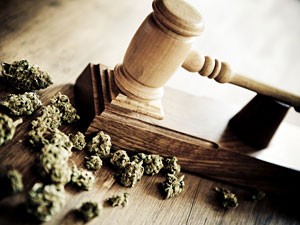Thankfully, it is becoming increasingly rare for low-level marijuana smokers to run into trouble with the law. It still happens an awful lot, but legalization is making it less common.
Even so, it’s possible to be arrested in many states, even for something as minor as simple marijuana possession. If it happens to you, booking, jail, and arraignment will be confusing enough. But what comes after that? Do you go to trial? If so, do you have a chance?
Police must have ‘probable cause’

This doesn’t take much. Any behavior or combination of behaviors suggesting the commission of a crime could add up to probable cause. This is also the standard police must meet if they want to search you and your property.
Booking at the nearest police precinct
Once an arrest is made, you are taken to the nearest police precinct and booked. This usually involves a mugshot, fingerprints, and any other steps needed to identify you. Then you are typically placed in a holding cell.
Arraignment
Next comes your arraignment, where bail is set. There’s always a good chance you’ll spend at least one night in jail before this hearing, more if you’re arrested at the start of a weekend. If you can’t post bail, you stay there until either you plead guilty or go to trial. If you can make bail, you’re released pending further proceedings in your case. Most suspects are released “on their own recognizance,” meaning they owe no bail and are on their honor to return to court for future hearings.
Court proceedings
Now on to court, where prosecutors file formal charges. Note that charges come from prosecutors, not from police. Cops who say they have the power to reduce charges if you cooperate are lying, plain and simple – as they’re allowed to do.
The period after charges are filed is where most of the legal action occurs, though it rarely happens in front of a judge. Instead, prosecutors use this time to pressure, cajole, and coerce defendants into pleading guilty.
Police encourage defendants to plead guilty
They do this in a couple of ways. First, they overcharge. It is very common for prosecutors to pile on unrealistic felony charges as a bargaining tactic. If you’re facing 20 years for cannabis trafficking, a 3-year bid for intent to sell doesn’t sound so bad.
Second, they threaten to call all your family and friends to testify against you. The hope is that your loyalty to these people will override your self-interest, and it often does. No one wants their mother to have to air dirty laundry in open court.
Will the case go to trial?

Actually, no, not really. The justice system is specifically designed and actively run in a way that powerfully discourages trials. They’re long, they’re incredibly expensive, and they force angry jurors to give up precious chunks of their free time. Nobody but a lawyer likes a trial.
So almost everyone pleads, assuming the charges involve something more than simple possession. Roughly 95 percent of all criminal cases end in a guilty plea. This is largely because the vast majority of accused criminals really did it, and they realize their chances aren’t good at trial.
If you plead, the judge will enter a conviction on your record, just as if a jury had found you guilty, and will then sentence you. But if you seek a trial, you could face weeks or even months of hearings before a jury that could take either pity on you or come to despise you. And the odds are never good.
What, then, should you do if you’re arrested on any kind of marijuana charge? First, avoid the inclination to talk. Confessing to police can only hurt you in the long run. And equally important, ask for a lawyer. Immediately.






